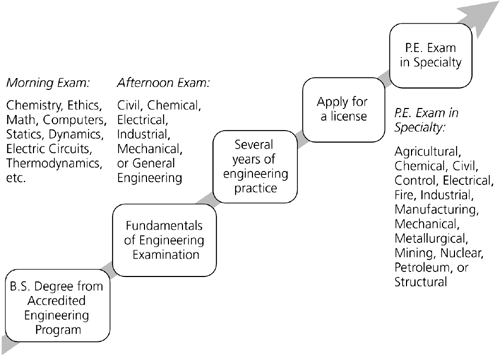Development of Professional Engineers
| As I've argued throughout the book, engineering makes a good model for a profession of software development, and the professional-development path that engineers follow does too. Professional engineering requires in-depth knowledge of both theory and practice. As Figure 18-2 illustrates, a professional engineer first obtains a Bachelor of Science degree from an accredited engineering school. An engineer then takes a Fundamentals of Engineering (FE) exam, which is sometimes called an Engineer in Training (EIT) exam. After passing the exam, the engineer works for several years under the guidance of a professional engineer. At the end of that period, the engineer takes a professional engineering exam in his or her specialty area such as civil, electrical, or chemical engineering. After passing that exam, the engineer's state, province, or territory issues a professional engineer license, and a new Professional Engineer is created. Figure 18-2. The occupational development path that professional engineers follow includes education, training, and experience. This provides a good model for professional development in software engineering.Source: Adapted from Dennis Frailey[5]
Striking the right balance between theory and practice in software engineering education depends on making a distinction between education and training. Education seeks to instill qualities in students that will enable them to respond effectively to diverse intellectual challenges. It focuses on general knowledge and includes development of critical thinking skills. Training provides specific skills and knowledge that can be applied immediately and repetitively. Education is strategic; training is tactical. The most common kind of occupational development for software developers today is training. It tends to be reactive and provided just in time in the specific technologies that a developer needs to know to work on a specific project. Education in longer-lasting software engineering principles is largely absent from the picture. Some people claim that software development has become too specialized and fragmented to be amenable to standardized education. It is too fragmented for standardized training, but not for standardized education. |
EAN: N/A
Pages: 164
